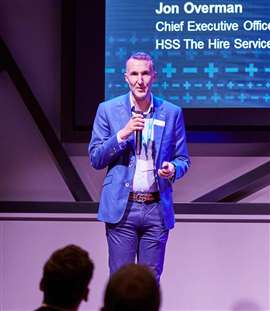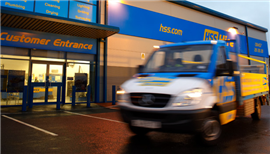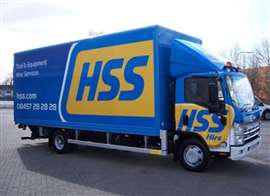Read this article in French German Italian Portuguese Spanish
Fewer sites, better returns: Inside HSS’s strategic reset under Overman
14 July 2025
HSS CEO Jon Overman discusses how its depot strategy is helping it to increase utilisation and better serve customers.
 Jon Overman, CEO of HSS’s traditional hire business, at the Rental eSummit. (Photo: Briggs & Stratton)
Jon Overman, CEO of HSS’s traditional hire business, at the Rental eSummit. (Photo: Briggs & Stratton)
Those in the UK will be familiar with HSS Hire, a name engrained in the fabric of the hire sector.
Founded in 1957 by Bert Taylor as the Hire Services Company, the business has been on something of a reimagining of its tool and equipment hire roots in recent years.
In 2024 it was announced that Group CEO Steve Ashmore would step down as part of a previously announced strategic shift that spilt the business into ProService and Operations, though he remains executive chairman for ProService and on the PLC board.
On the HSS Operations side, which is now known as HSS The Hire Service Company, that strategic shift has seen the company rebalance its physical footprint, modernise its logistics network, and make strategic investments in fleet and partnerships to meet a changing UK market.
That has seen the company undertake a cost rationalisation programme in the fourth quarter of 2024, which included the closure of 10 operating sites.
At the time, it said the decision was driven by both market conditions and a broader strategy to optimise its network and improve asset utilisation in key customer areas.
“Over 27 years, we’ve been up to 500 [depots],” says HSS The Hire Service Company CEO Jon Overman, who began his career at HSS as a Saturday boy. “A real sweet spot is around 150. Right now, we’ve got 117 concessions and 21 of our own depots doing the work for all of those concessions. We’ve also got a few more in build.”
 Image: HSS Hire Group
Image: HSS Hire Group
Improved utilisation and redeployment
With the reorganisation, the company is favouring steady, performance-led growth with a sharp focus on utilisation and asset efficiency instead of chasing scale for its own sake.
This means that the company is “sweating the assets more” and using data to place fleet where it performs best.
The refined approach, which he says has been a gradual process, has helped the company increase output despite operating from fewer sites, Overman tells IRN at one of its depots which backs on to Heathrow Airport.
“Since shutting those depots, we’re actually doing more jobs from the ones we have than when we had 32. You put more kit into areas with higher demand... it’s where the customers need it.”
He adds that the redeployment strategy has meant equipment is no longer stranded in lower-demand areas like the Isle of Wight or remote depots, instead placed strategically for optimal access.
Overman explains that to date the company has relocated around £10 million worth of equipment from underperforming branches into high-demand areas to improve availability, responsiveness, and returns.
 Photo: HSS
Photo: HSS
This, he adds, results in faster turnaround, better availability, and ultimately better customer service while still being able to cover the same ground. “We’re covering about 95% of the country and doing it more efficiently.
“The ones who want kit are getting what they need. In London, for example, there’s now more accessible equipment because of the density of work.”
Strategically placing equipment closer to demand has had a clear impact on returns, too, he explains. “If you put a pound of equipment into a site like this, you can get a pound of gross profit back.
“At some of the closed depots, you’d only see 20 to 30 pence back.” He goes on to say that this more selective model allows HSS to maximise ROI while reducing operational drag; “So while we’re still national, we’re more focused on a slightly smaller footprint that gives really good returns and lets us concentrate our efforts.”
Although the consolidation has raised eyebrows externally, Overman, who was appointed CEO of HSS The Hire Service Company last year, stresses that the shift wasn’t driven by cost-cutting alone.
“They’re mostly legacy models, three to four thousand square feet, and some were just not as efficient” he reveals. “In a modern depot, one manager can cover four drivers. Across a couple of older smaller locations, you’d have two drivers and two managers. At a 24/7 depot like this one, you’d have one manager for four drivers.”
Efficiency like the new network, he argues, is paramount in today’s market, with a responsive delivery network now a competitive advantage amidst a challenging market backdrop; “With today’s inflationary pressures, efficiency is everything. If you’ve got a strong delivery network, you can win.”
New hubs and partnerships
At the same time, HSS has gone about consolidating smaller depots in Sheffield and Hull into a new 100,000sqft site in Doncaster, while simultaneously rolling out smaller local concessions through merchant partnerships.
“We’ve opened 10 new concessions with builders’ merchants this year alone, with another 10–15 in build or spec,” says Overman.
He describes the merchant model as a low-capex, high-access channel that helps the company scale flexibly without the need for a large depot network.
By mid-summer, a second phase with Selco, with which it is in 23 stores, is expected to be completed, with nine new locations scheduled, four already opened and another imminent.
The company has also expanded its collaboration with TradeKart, aiming to boost its on-demand delivery capabilities, with some deliveries arriving within the hour.
Meanwhile, on the equipment side, HSS has been investing in its fleet, bringing in new JCB diggers and dumpers and extending its powered access range, amounting to £8 million in capex spend by the halfway point of the year.
“We’ve already added diggers and dumpers. The JCBs are coming in, so that’s on the periphery of what we do. The power access fleet has been extended too. We’ll go slightly higher up the range, but it’s still within the core rather than venturing into areas like portaloo’s.”
He says fleet investment is being targeted at high-rotation, high-margin categories that customers regularly rehire.
Overman adds, “We’ll continue to explore items that our customers are regularly rehiring and that fit within our technical capabilities.”
A hybrid future for rental
Central to the modernised model is HSS’s dual-structure business: HSS The Hire Service Company (focused on operational efficiency) and ProService, its digital rental marketplace.
ProService, now a cornerstone of the company’s strategy led by CEO Tom Shorten, plays a vital role in its operations. “They’re our biggest customer,” Overman explains when asked how the two interact and differ. “We’ve got a right-of-first-refusal agreement. If a job comes in their postcode, they offer it to us first. If we can’t do it, they go to their wider supply chain.”
He believes that this dynamic allows HSS to win work it couldn’t otherwise reach, while ProService benefits from reliable fulfilment.
He continues, “Their tech is great. Shops can log in and book rehire gear like a customer would. One invoice from us, even if the digger comes from us and the porta potty comes from their supplier. It’s like Deliveroo for hire.”
The synergy also allows each business to play to its strengths; “We’re asset-heavy, they’re asset-light. That’s why we’ve put in two dedicated management teams, one for each.”
It’s this hybrid model of renting that the company has high hopes for, and one that Overman himself believes could be the future. He says, “It’ll be hybrid. In 10 years, there will still be people who want to phone or walk into a store.
“Right now, people call because they don’t trust hire companies to deliver—they want that assurance from someone they know. We’re trying to fix that with better logistics and better drivers—to be more credible than the rest of the industry.”
He believes trust, speed, and transparency will be key to converting customers to online channels; “People also phone because they want recommendations. Maybe AI will help people get those answers quickly without needing to call. That’s how I see the evolution of hire. More tech, more trust, and more options.”
Growth, consolidation, and opportunity
With ProService growing fast, HSS is also considering acquisitions to expand their product offering, although nothing is set in stone. This would help them serve an even wider range of customers with specialist requirements as well as helping them fulfil even more of ProService’s requirements.
“They would help reduce our reliance on ProService, which, while still part of the Group, represents a significant customer concentration,” says Overman.
So what kinds of businesses are on the radar? “Niche players. Businesses that are hard to replicate, maybe with little or no competition. Those are really interesting to us.”
He adds that these targets offer strong margins and defendable positions, helping to future-proof the business.
The company is also focused on maturing its existing partnerships and concessions. “Our builders’ merchant locations are maturing and reaching stable run rates. And we’re investing in our own sales teams, focused on Tier 2 and 3 contractors,” says Overman.
He believes that this segment often values speed, service, and relationships over price, areas where “HSS can win.”
Operational discipline is also top of mind. “We want strong contribution margins. It’s easy to say yes to costs, but they creep in everywhere. We’re passionate about being efficient.”
Navigating market headwinds
Despite a challenging market backdrop—including the loss of the Amey contract last year—Overman remains optimistic. “We’ve got a strong pipeline. There’s no silver bullet. You dust yourself off, tender, build new relationships.”
He views setbacks as part of the natural cycle and says the business is better positioned structurally than ever before.
And, while recent financial results showed a dip for the company, Overman says this is reflective of wider market pressures.
“The market has been tough for 18 months. None of the quoted companies are delivering stellar results.”
He adds, “Look at Sunbelt wanting to delist from the London exchange. It shows how mid-cap construction-related businesses are often undervalued here.”
To respond, HSS has reviewed every part of its operation. “We’ve gone from about 3,000 products to 2,000 prime hire items,” says Overman. “We’re good at those. But if you start going into big power or big powered access, you need real experts—and that’s where our rehire partners come in.”
He notes that HSS is now a major customer to some rehire suppliers, in some cases accounting for over half their revenue. “Those partnerships are hugely important.”
The strategic response to market pressures has been to refocus the business entirely. “Over a year ago, we reviewed every element. What worked, what didn’t, where we were profitable. We can’t be all things to all people.
“Nationals sometimes try to replicate what independents do everywhere, but that adds cost. We’re focused on doing what we do, really well, in the areas we choose to deliver.”
Delivering at scale
As for further depot closures linked to its restructuring, Overman says it’s an ongoing assessment, “We’ve made the best of the depots we’ve got, but we’d like some bigger ones so we can do more from fewer sites. But that’s about timing, cash and finding the right property, moving, realising the lease, and fitting it out.”
Looking ahead, the immediate priority, he says, is to roll out more large-volume Customer Delivery Centres (CDCs) like the one at Heathrow.
“That gives a high level of customer service, which is really your differentiator. This market is still 60% independents because of the reliability they offer. If we can mimic that reliability nationally, that’s our winning formula.”
The focus, he explains, is on empowering depot teams with the tools, systems and autonomy to excel.
“You could go to a customer in the old days and say, well, you’ve got a great depot in Old Kent Road, a brilliant one in Watford, but in this area, it’s really shoddy. We’re trying to fix that.”
At the Heathrow CDC, the scale is clear. “A depot like this can do 250 deliveries and collections in a day. So, they’ve got to be well organised. You’ve got to have good processes and systems that support them to be able to do volume that way.”
With that, Overman is confident that the company is on the right path, with the “operational intensity” the new benchmark for its national service ambitions.
“We believe what we’ve done will help maximise investor returns,” he concludes.
STAY CONNECTED



Receive the information you need when you need it through our world-leading magazines, newsletters and daily briefings.
CONNECT WITH THE TEAM









